
Kresna-Razlog Uprising
Encyclopedia
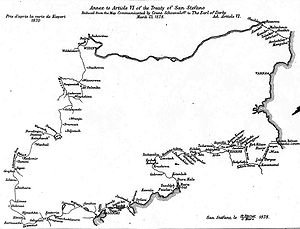
Bulgaria
Bulgaria , officially the Republic of Bulgaria , is a parliamentary democracy within a unitary constitutional republic in Southeast Europe. The country borders Romania to the north, Serbia and Macedonia to the west, Greece and Turkey to the south, as well as the Black Sea to the east...
n uprising against the Ottoman
Ottoman Empire
The Ottoman EmpireIt was usually referred to as the "Ottoman Empire", the "Turkish Empire", the "Ottoman Caliphate" or more commonly "Turkey" by its contemporaries...
rule, predominantly in the areas of Kresna
Kresna
Kresna is a town and municipality in Blagoevgrad Province in Bulgaria.It is located in the southwestern part of Bulgaria.-Geography:The town of Kresna lies at the north end of the Kresna Gorge of the Struma River at the foot of Pirin mountain. The Melo hills are striking sandstone formations...
and Razlog
Razlog
Razlog is a town and ski resort in Razlog Municipality, Blagoevgrad Province in southwestern Bulgaria. It is situated in the Razlog Valley and was first mentioned during the reign of Byzantine emperor Basil II....
in the region of Pirin Macedonia in late 1878 and early 1879. It broke out following the protests and spontaneous opposition to the decisions of the Congress of Berlin
Congress of Berlin
The Congress of Berlin was a meeting of the European Great Powers' and the Ottoman Empire's leading statesmen in Berlin in 1878. In the wake of the Russo-Turkish War of 1877–78, the meeting's aim was to reorganize the countries of the Balkans...
, which, instead of ceding the Bulgarian-populated parts of Macedonia to the newly reestablished Bulgarian state as per the Treaty of San Stefano
Treaty of San Stefano
The Preliminary Treaty of San Stefano was a treaty between Russia and the Ottoman Empire signed at the end of the Russo-Turkish War, 1877–78...
, returned them to Ottoman control. It was prepared by the "Edinstvo" Committee.
Prelude to the Uprising
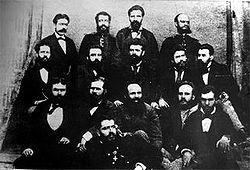
Veliko Tarnovo
Veliko Tarnovo is a city in north central Bulgaria and the administrative centre of Veliko Tarnovo Province. Often referred to as the "City of the Tsars", Veliko Tarnovo is located on the Yantra River and is famous as the historical capital of the Second Bulgarian Empire, attracting many tourists...
in order to implement the plan. This meeting resulted in the creation of a committee called, Edinstvo (Unity). The initiative for this belonged to Lyuben Karavelov
Lyuben Karavelov
Lyuben Stoychev Karavelov was a Bulgarian writer and an important figure of the Bulgarian National Revival....
, Stefan Stambolov
Stefan Stambolov
Stefan Nikolov Stambolov was a Bulgarian politician, who served as Prime Minister and regent. He is considered one of the most important and popular "Founders of Modern Bulgaria", and is sometimes referred to as "the Bulgarian Bismarck".- Early years :Stambolov was born in Veliko Tarnovo...
and Hristo Ivanov. The basic task of this newly created committee was to establish similar committees throughout Bulgaria, to maintain strict contact with them, and work toward the same end: "unity of all the Bulgarians" and the improvement of their present political situation.
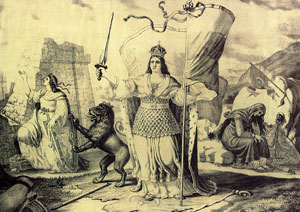
Eastern Rumelia
Eastern Rumelia or Eastern Roumelia was an administratively autonomous province in the Ottoman Empire and Principality of Bulgaria from 1878 to 1908. It was under full Bulgarian control from 1885 on, when it willingly united with the tributary Principality of Bulgaria after a bloodless revolution...
and to Russia
Russia
Russia or , officially known as both Russia and the Russian Federation , is a country in northern Eurasia. It is a federal semi-presidential republic, comprising 83 federal subjects...
and Romania
Romania
Romania is a country located at the crossroads of Central and Southeastern Europe, on the Lower Danube, within and outside the Carpathian arch, bordering on the Black Sea...
as well. People were also sent to Macedonia to personally acquaint themselves with the situation there. Some were also sent to meet with Nathanael, the Ohrid bishop
Nathanael Ohridski
Nathanael of Ohrid , Nathanael of Plovdiv or Nathanael Zografski, born Nesho Stanov Boykikev; was a Bulgarian cleric, writer and revolutionary from Macedonia, one of the first supporters of literature in modern Bulgarian and one of the early...
. He was to be told the aim and the task of Edinstvo. Meanwhile, Nathanael was already in the middle of preparations for armed activities in Macedonia. He made his way to Kyustendil
Kyustendil
Kyustendil is a town in the far west of Bulgaria, the capital of Kyustendil Province, with a population of 44 416 . Kyustendil is situated in the southern part of the Kyustendil Valley, 90 km southwest of Sofia...
to meet with the well-known haiduk leader, Ilyo Voyvoda
Ilyo Voyvoda
Iliya Markov Popgeorgiev, better known as Ilyo Voyvoda or Dedo Iljo Maleshevski, was a Bulgarian revolutionary from the region of Macedonia, who is considered a national hero in both Bulgaria and the Republic of Macedonia...
and his rebels. At this meeting it was decided that Natanail should take over leadership of the hajduk
Hajduk
Hajduk is a term most commonly referring to outlaws, highwaymen or freedom fighters in the Balkans, Central- and Eastern Europe....
bands. At the same time, Nathanael was able to establish an Edinstvo headquarters in the Kyustendil
Kyustendil
Kyustendil is a town in the far west of Bulgaria, the capital of Kyustendil Province, with a population of 44 416 . Kyustendil is situated in the southern part of the Kyustendil Valley, 90 km southwest of Sofia...
, one in Dupnitsa and another in Gorna Dzhumaya
Blagoevgrad
Blagoevgrad is а city in southwestern Bulgaria, the administrative centre of Blagoevgrad Province, with a population of about 74,302 . It lies on the banks of the Blagoevgradska Bistritsa River....
. The concrete aims of the leaders and organizers of the Kresna-Razlog Uprising were to revoke the decisions of the Berlin Congress, to liberate the regions inhabited by Bulgarian population, and to unite with the free Principality of Bulgaria
Principality of Bulgaria
The Principality of Bulgaria was a self-governing entity created as a vassal of the Ottoman Empire by the Treaty of Berlin in 1878. The preliminary treaty of San Stefano between the Russian Empire and the Porte , on March 3, had originally proposed a significantly larger Bulgarian territory: its...
. By these reasons Metropolitan Nathanael of Ohrid
Nathanael Ohridski
Nathanael of Ohrid , Nathanael of Plovdiv or Nathanael Zografski, born Nesho Stanov Boykikev; was a Bulgarian cleric, writer and revolutionary from Macedonia, one of the first supporters of literature in modern Bulgarian and one of the early...
wrote to Petko Voyvoda
Petko Voyvoda
Petko Kiryakov Kaloyanov , better known as Captain Petko Voyvoda was a 19th-century Bulgarian hajduk leader and revolutionary who dedicated his life to the liberation of Bulgaria .Born in the Bulgarian village of Dogan Hisar, today Esimi in Aegean Thrace, today Evros Prefecture,...
: "...As it is very necessary that you meet Dimitar Pop Georgiev - Berovski
Dimitar Pop Georgiev - Berovski
Dimitar Popgeorgiev Berovski was a Bulgarian revolutionary from Macedonia. He is considered an ethnic Macedonian by historians from the Republic of Macedonia....
, who is in Gorna Dzhumaya
Blagoevgrad
Blagoevgrad is а city in southwestern Bulgaria, the administrative centre of Blagoevgrad Province, with a population of about 74,302 . It lies on the banks of the Blagoevgradska Bistritsa River....
and is the leader of the defenders of the people in these border areas, in order to discuss a very important matter to the benefit of all Bulgarians
Bulgarians
The Bulgarians are a South Slavic nation and ethnic group native to Bulgaria and neighbouring regions. Emigration has resulted in immigrant communities in a number of other countries.-History and ethnogenesis:...
, whom the Berlin Congress has again left under Turkish tyrannical rule..."
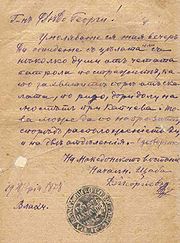
Rila Monastery
The Monastery of Saint Ivan of Rila, better known as the Rila Monastery is the largest and most famous Eastern Orthodox monastery in Bulgaria. It is situated in the southwestern Rila Mountains, south of the capital Sofia in the deep valley of the Rilska River at an elevation of above sea level...
hosted a critical meeting attended by Metropolitan Nathanael of Ohrid, Dimitar Pop Georgiev - Berovski
Dimitar Pop Georgiev - Berovski
Dimitar Popgeorgiev Berovski was a Bulgarian revolutionary from Macedonia. He is considered an ethnic Macedonian by historians from the Republic of Macedonia....
, Ilyo Voyvoda
Ilyo Voyvoda
Iliya Markov Popgeorgiev, better known as Ilyo Voyvoda or Dedo Iljo Maleshevski, was a Bulgarian revolutionary from the region of Macedonia, who is considered a national hero in both Bulgaria and the Republic of Macedonia...
, Mihail Sarafov, tbe voivode Stoyan Karastoilov and other high-ranking figures. The conference led to the formation of an organized insurrectional staff headed by Berovski. The Edinstvo ("Unity") Committee from Sofia
Sofia
Sofia is the capital and largest city of Bulgaria and the 12th largest city in the European Union with a population of 1.27 million people. It is located in western Bulgaria, at the foot of Mount Vitosha and approximately at the centre of the Balkan Peninsula.Prehistoric settlements were excavated...
aided the insurrectionsts with two detachments, one led by the Russia
Russia
Russia or , officially known as both Russia and the Russian Federation , is a country in northern Eurasia. It is a federal semi-presidential republic, comprising 83 federal subjects...
n Adam Kalmykov and the other by the Pole
Poland
Poland , officially the Republic of Poland , is a country in Central Europe bordered by Germany to the west; the Czech Republic and Slovakia to the south; Ukraine, Belarus and Lithuania to the east; and the Baltic Sea and Kaliningrad Oblast, a Russian exclave, to the north...
Luis Wojtkiewicz. The aim of "Edinstvo Committees" was "...discussing how to help our brothers in Thrace and Macedonia, who will henceforth be separated from Danubian Bulgaria by virtue of the decisions of the Berlin Congress..." Stefan Stambolov
Stefan Stambolov
Stefan Nikolov Stambolov was a Bulgarian politician, who served as Prime Minister and regent. He is considered one of the most important and popular "Founders of Modern Bulgaria", and is sometimes referred to as "the Bulgarian Bismarck".- Early years :Stambolov was born in Veliko Tarnovo...
and Nikola Obretenov
Nikola Obretenov
Nikola Tihov Obretenov was a Bulgarian revolutionary, one of the combatants for the liberation of Bulgaria, and a participant in the Stara Zagora Uprising and the April Uprising...
suggested the appointment of apostles who would organize the uprising among the masses, but it was decided that only the areas closest to the Principality of Bulgaria would revolt, with a view to detaching them from the Ottoman Empire and joining them to Bulgaria.
Uprising
Early at dawn on October 5, 1878, 400 insurgents attacked the Turkish army unit stationed at the KresnaKresna
Kresna is a town and municipality in Blagoevgrad Province in Bulgaria.It is located in the southwestern part of Bulgaria.-Geography:The town of Kresna lies at the north end of the Kresna Gorge of the Struma River at the foot of Pirin mountain. The Melo hills are striking sandstone formations...
Inns and after a battle lasting 18 hours they succeeded in crushing its resistance. This attack and this first success marked the beginning of the Kresna-Razlog Uprising. In the battles that followed, the insurgents succeeded in liberating 43 towns and villages and in reaching Belitsa
Belitsa
Belitsa is a town in southwestern Bulgaria, located in the Belitsa Municipality of the Blagoevgrad oblast .-External links:* *...
and Gradeshnitsa
Gradeshnitsa
Gradeshnitsa is a village of the Vratsa Province, Bulgaria.The village is notable for the Gradeshnitsa monastery , and for the neolithic Gradeshnitsa tablets now kept in Vratsa museum....
to the south. To the south-west they established their sway over almost the entire Karshijak region, while to the south-east the positions of the insurgents were along the Predela, over the town of Razlog
Razlog
Razlog is a town and ski resort in Razlog Municipality, Blagoevgrad Province in southwestern Bulgaria. It is situated in the Razlog Valley and was first mentioned during the reign of Byzantine emperor Basil II....
. In addition to the direct military operations of the insurgents, there were separate detachments operating in the south and to the west in Macedonia
Macedonia (region)
Macedonia is a geographical and historical region of the Balkan peninsula in southeastern Europe. Its boundaries have changed considerably over time, but nowadays the region is considered to include parts of five Balkan countries: Greece, the Republic of Macedonia, Bulgaria, Albania, Serbia, as...
. There were also disturbances, and delegations were sent to the headquarters of the Uprising with requests for arms and for aid. The headquarters of the Uprising, which was organized in the course of the military operations, was headed by Dimiter Popgeorgiev. Elders’ Councils were also set up, as well as local police organs of the revolutionary government who were assigned certain administrative functions in the liberated territories.

Blagoevgrad
Blagoevgrad is а city in southwestern Bulgaria, the administrative centre of Blagoevgrad Province, with a population of about 74,302 . It lies on the banks of the Blagoevgradska Bistritsa River....
played an important part in organizing, supplying and assisting the Uprising. The Committee was headed by Kostantin Bosilkov, who was born in the town of Koprivshtitsa
Koprivshtitsa
Koprivshtitsa is a historic town in Sofia Province, central Bulgaria, lying on the Topolnitsa River among the Sredna Gora mountains. It was one of the centres of the April Uprising in 1876 and is known for its authentic Bulgarian architecture and for its folk music festivals, making it a very...
and who had worked for many years as teacher in the Macedonia region. The main goal of the armed struggle though, was expressed most clearly in the letter of the Melnik
Melnik
-Places:Bulgaria* Melnik, Bulgaria, a town in Bulgaria* Shiroka Melnishka Losa, a Bulgarian wine grape also known as MelnikCzech Republic* Mělník, a townUnited States* Melnik, Wisconsin, an unincorporated community...
rebels of December 11, 1878, which they sent to the chief of the Petrich
Petrich
Petrich is a town in Blagoevgrad Province in southwestern Bulgaria, located at the foot of the Belasica Mountains in the Strumeshnitsa Valley. , the town has 29920 inhabitants.Petrich is located close to the borders with Greece and the Republic of Macedonia...
police: “...We took up the arms and will not leave them until we get united with the Bulgarian Principality... ” This aim was also expressed in the appeal launched by the insurgents on November 10, 1878, which read: “...And so, brothers, the time has come to demonstrate what we are, that we are a people worthy of liberty, and that the blood of Kroum and Simeon
Simeon I of Bulgaria
Simeon I the Great ruled over Bulgaria from 893 to 927, during the First Bulgarian Empire. Simeon's successful campaigns against the Byzantines, Magyars and Serbs led Bulgaria to its greatest territorial expansion ever, making it the most powerful state in contemporary Eastern Europe...
is still flowing in our veins; the time has come to demonstrate to Europe that it is no easy task when a people wants to cast away darkness...” During the military operations in the Kresna region, an uprising broke out on November 8, 1878, in the Bansko
Bansko
Bansko is a town and a popular ski resort in southwestern Bulgaria, located at the foot of the Pirin Mountains at an elevation of 925 m above sea level....
-Razlog valley. The detachment of volunteers from Moesia
Moesia
Moesia was an ancient region and later Roman province situated in the Balkans, along the south bank of the Danube River. It included territories of modern-day Southern Serbia , Northern Republic of Macedonia, Northern Bulgaria, Romanian Dobrudja, Southern Moldova, and Budjak .-History:In ancient...
, led by Banyo Marinov, a revolutionary and volunteer from the Russo-Turkish War (1877–1878), played an important part in that uprising. It was promptly joined by scores of local insurgents and, after a fierce skirmish, it succeeded in liberating the town of Bansko. The setbacks in the autumn of 1878 led to a new organization of the leading body of the Uprising and to the adoption of new tactics. Efforts were now directed toward the setting up of a Central Committee which was to take over the leadership of the Uprising, as well as to organize an uprising in the interior of Macedonia in the spring of 1879. The detachment which crossed into Macedonia in May 1879 could not fulfill its task due to the lack of preliminary organization. These events marked the end of the Kresna-Razlog Uprising.
Significance and consequences
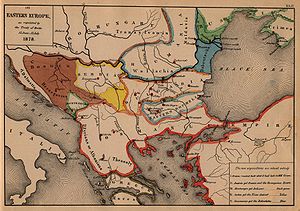
Russia
Russia or , officially known as both Russia and the Russian Federation , is a country in northern Eurasia. It is a federal semi-presidential republic, comprising 83 federal subjects...
’s military, diplomatic and political support, in addition to its being against the interests of Austria-Hungary
Austria-Hungary
Austria-Hungary , more formally known as the Kingdoms and Lands Represented in the Imperial Council and the Lands of the Holy Hungarian Crown of Saint Stephen, was a constitutional monarchic union between the crowns of the Austrian Empire and the Kingdom of Hungary in...
and Britain
United Kingdom of Great Britain and Ireland
The United Kingdom of Great Britain and Ireland was the formal name of the United Kingdom during the period when what is now the Republic of Ireland formed a part of it....
. Russia
Russia
Russia or , officially known as both Russia and the Russian Federation , is a country in northern Eurasia. It is a federal semi-presidential republic, comprising 83 federal subjects...
was exhausted both financially and militarity, and she adopted a firm course of adhering to the decisions of the Berlin Congress in relation to Macedonia. Her strategic aim lay in the preservation of the Bulgarian character of Eastern Roumelia. It encountered yet another strong adversary - the military and political machine of the Ottoman
Ottoman Empire
The Ottoman EmpireIt was usually referred to as the "Ottoman Empire", the "Turkish Empire", the "Ottoman Caliphate" or more commonly "Turkey" by its contemporaries...
state.
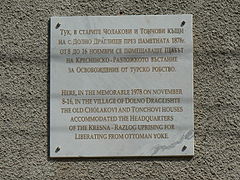
Principality of Bulgaria
The Principality of Bulgaria was a self-governing entity created as a vassal of the Ottoman Empire by the Treaty of Berlin in 1878. The preliminary treaty of San Stefano between the Russian Empire and the Porte , on March 3, had originally proposed a significantly larger Bulgarian territory: its...
, who sympathised with the struggle, were reprimanded by the Russian Emperor in person. These were the decisive reasons for Its failure, parallel with reasons of internal and organizational character. Typical for the uprising was the scale participation of volunteers - Bulgarians
Bulgarians
The Bulgarians are a South Slavic nation and ethnic group native to Bulgaria and neighbouring regions. Emigration has resulted in immigrant communities in a number of other countries.-History and ethnogenesis:...
of all parts of the country. Some figures as an illustration: 100 volunteers from Sofia
Sofia
Sofia is the capital and largest city of Bulgaria and the 12th largest city in the European Union with a population of 1.27 million people. It is located in western Bulgaria, at the foot of Mount Vitosha and approximately at the centre of the Balkan Peninsula.Prehistoric settlements were excavated...
, 27 from Tirnovo, 65 from Pazardzhik
Pazardzhik
Pazardzhik is a city situated along the banks of the Maritsa river, Southern Bulgaria. It is the capital of Pazardzhik Province and centre for the homonymous Pazardzhik Municipality...
, 19 from Troyan
Troyan
Troyan is a town in Lovech Province in central Bulgaria with population of 21,997 inhabitants, as of December 2009,. It is the administrative centre of the homonymous Troyan Municipality. The town is about 160 km away from the country capital Sofia. The nearest civilian airport is Gorna...
, 31 from Pleven
Pleven
Pleven is the seventh most populous city in Bulgaria. Located in the northern part of the country, it is the administrative centre of Pleven Province, as well as of the subordinate Pleven municipality...
, 74 from Orhanye
Botevgrad
Botevgrad ; pre-1866: Samundzhievo ), is a town in western Bulgaria. It is located in Sofia Province and is close to Pravets. Botevgrad is situated at a 47-km-distance from Sofia.-Geography:...
, 129 from the Plovdiv
Plovdiv
Plovdiv is the second-largest city in Bulgaria after Sofia with a population of 338,153 inhabitants according to Census 2011. Plovdiv's history spans some 6,000 years, with traces of a Neolithic settlement dating to roughly 4000 BC; it is one of the oldest cities in Europe...
district, 17 from Provadia, 30 from Eastern Rumelia
Eastern Rumelia
Eastern Rumelia or Eastern Roumelia was an administratively autonomous province in the Ottoman Empire and Principality of Bulgaria from 1878 to 1908. It was under full Bulgarian control from 1885 on, when it willingly united with the tributary Principality of Bulgaria after a bloodless revolution...
and others. A large number of insurgents and leaders of different parts of Macedonia also participated in the uprising. After the Upspring some 30,000 refugees fled to Bulgaria. The failure of the uprising lead to the attention of the Bulgarian political and strategic leaders to liberation of the other parts of the Bulgarian territories and to other main strategic objective - unification of the Principality of Bulgaria
Principality of Bulgaria
The Principality of Bulgaria was a self-governing entity created as a vassal of the Ottoman Empire by the Treaty of Berlin in 1878. The preliminary treaty of San Stefano between the Russian Empire and the Porte , on March 3, had originally proposed a significantly larger Bulgarian territory: its...
and Eastern Roumelia, the later being under Sultans power, but still having a large autonomy. Macedonia and Thrace
Thrace
Thrace is a historical and geographic area in southeast Europe. As a geographical concept, Thrace designates a region bounded by the Balkan Mountains on the north, Rhodope Mountains and the Aegean Sea on the south, and by the Black Sea and the Sea of Marmara on the east...
should have to wait.
Controversy
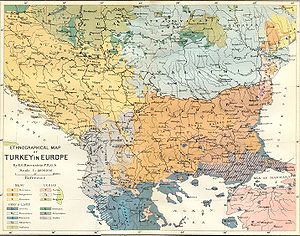
Macedonia (region)
Macedonia is a geographical and historical region of the Balkan peninsula in southeastern Europe. Its boundaries have changed considerably over time, but nowadays the region is considered to include parts of five Balkan countries: Greece, the Republic of Macedonia, Bulgaria, Albania, Serbia, as...
, the issue on national and ethnic affiliations of the insurgents is contested in the Republic of Macedonia. The uprising is regarded as ethnic Macedonian by the historians from Rep. of Macedonia
Republic of Macedonia
Macedonia , officially the Republic of Macedonia , is a country located in the central Balkan peninsula in Southeast Europe. It is one of the successor states of the former Yugoslavia, from which it declared independence in 1991...
. They support their perception of the existence of a Macedonian ethnicity at that time with the Proclamation of Kresna Uprising, which is considered а forged document by Bulgarian scientists. Bulgarians argued about existing of original "Temporary rules about the organisation of the Macedonian Upspring" prepared from Stefan Stambolov
Stefan Stambolov
Stefan Nikolov Stambolov was a Bulgarian politician, who served as Prime Minister and regent. He is considered one of the most important and popular "Founders of Modern Bulgaria", and is sometimes referred to as "the Bulgarian Bismarck".- Early years :Stambolov was born in Veliko Tarnovo...
and Nathanael of Ohrid.
Macedonian historians argue also that the use of the word "Bulgarian" in Ottoman Macedonia
Macedonia (region)
Macedonia is a geographical and historical region of the Balkan peninsula in southeastern Europe. Its boundaries have changed considerably over time, but nowadays the region is considered to include parts of five Balkan countries: Greece, the Republic of Macedonia, Bulgaria, Albania, Serbia, as...
does not refer to ethnicity, and that it had been synonymous with "Christian" or "peasant". Bulgarian historians argue that the term "Macedonian" has never been used in an ethnic but in regional sense, similar to the regional term "Thracian" and note that no distinction between a "Macedonian Bulgarians", "Bulgarians" and "Slavs" existed at that time pointing to the correspondence of the insurgents of the upspring with the Bulgarian committees "Edinstvo" - (Unity).
See also
- National awakening of BulgariaNational awakening of BulgariaBulgarian nationalism emerged in the early 19th century under the influence of western ideas such as liberalism and nationalism, which trickled into the country after the French revolution, mostly via Greece, although there were stirrings in the 18th century. Russia, as fellow Orthodox Slavs, could...
- Bulgarian unificationBulgarian unificationThe Unification of Bulgaria was the act of unification of the Principality of Bulgaria and the then-Ottoman province of Eastern Rumelia in the autumn of 1885. It was co-ordinated by the Bulgarian Secret Central Revolutionary Committee...
- Ilinden-Preobrazhenie UprisingIlinden-Preobrazhenie UprisingThe Ilinden–Preobrazhenie Uprising or simply the Ilinden Uprising of August 1903 |Macedonia]] affected most of the central and southwestern parts of the Monastir Vilayet receiving the support mainly of the local Bulgarian peasants and to some extent of the Aromanian population of the region...
- Macedonism
Sources
- Дойно Дойнов. Кресненско-Разложкото въстание, 1878-1879 Принос за неговия обхват и резултати, за вътрешните и външнополитическите условия, при които избухва, протича и стихва. (Издателство на Българската Академия на науките. София, 1979) (Doyno Doynov. Kresna-Razlog uprising 1878-1879: On its scope and results, internal and external political circumstances in which it starts, continues, and ends. Sofia. 1979. Published by the Bulgarian Academy of Sciences)http://www.promacedonia.org/dd2/index.html
- BULGARIAN ACADEMY OF SCIENCES Institute of History Bulgarian Language Institute - MACEDONIA, DOCUMENTS AND MATERIALS. Sofia 1978 http://www.kroraina.com/knigi/en/ban/index.html
- БАЛКАНСКИТЕ ДЪРЖАВИ И МАКЕДОНСКИЯТ ВЪПРОС - Антони Гиза.(превод от полски - Димитър Димитров, Македонски Научен Институт, София, 2001) http://www.kroraina.com/knigi/ag/ag_1_8.html

